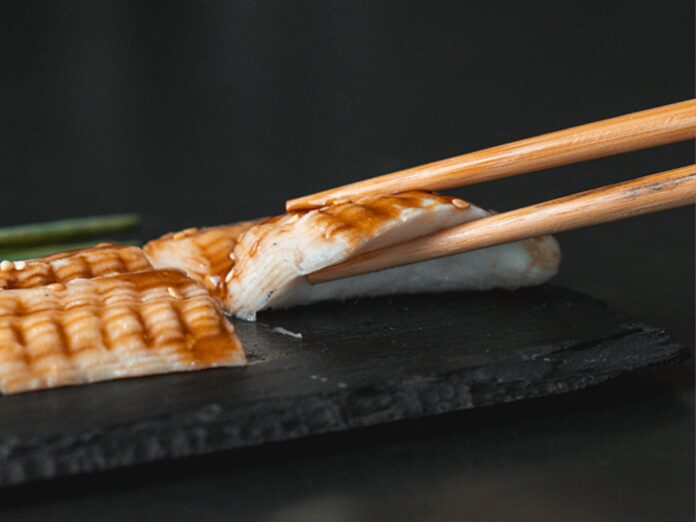4 Mins Read
Israeli startup Steakholder Foods has unveiled the industry’s first 3D-printed eel to battle an industry riddled with overfishing and facing the threat of extinction. It is expected to include some cultivated eel cells at a future stage.
Steakholder Foods, the Israeli 3D-printing and cultivated meat and seafood startup that began as MeaTech, has unveiled a prototype of its 3D-printed plant-based eel, using precision layering and a unique mix of materials to achieve the fish’s complex texture.
It comes months after the producer debuted the world’s first cultivated grouper fish with Singaporean cultured meat maker Umami Meats, on the back of a $1M grant from the bipartite Singapore-Israel Industrial R&D Foundation.
Plant-based for now, but hybrid fish in the plan
Steakholder Foods’ 3D bioprinting process – called DropJet – allows it to drastically reduce the number of ingredients in its vegan eel – catering to the growing consumer demand for clean-label formulations. In 2020, a global survey by Ingredion revealed that over half of respondents find it important for products to have a short ingredient list, while its latest data has found that 78% would spend more money on products with ‘natural’ or ‘all-natural’ packaging claims.
And while the eel is currently made up of fully plant-based ingredients, as a cultured meat company that has previously expressed interest in hybrid meat, it perhaps comes as no surprise that it expects to include cultured eel cells in the product at a later stage, if the “economies of scale allow price-competitive cell development”.
The news comes a few months after the startup announced a multi-million-dollar strategic partnership with an accredited governmental body based in the Gulf Cooperation Council to create hybrid fish products and tackle food insecurity in the region, with the eventual goal of establishing a large-scale production facility.
Steakholder Foods, which is currently conducting a life-cycle assessment for its seafood analogue, is exploring collaborations to commercialise its plant-based eel by offering them proprietary 3D printers and ink that can generate revenue in the short term. It claims that its current tech capabilities will allow B2B partners to mass-produce price-competitive 3D-printed eels, enabling them to tackle the challenges associated with the current global costs of eels.
“This technology is designed to enable partners to generate products on a potential industrial scale of hundreds of tons monthly, not only at lower costs compared to wild eel, but also with the flexibility to create a variety of printed products using the same production line,” explained its CEO Arik Kaufman.
Why alternatives to eel are necessary
In Japan, where over 70% of all eel catch is consumed, the fish has always maintained its luxury status, with wholesale prices reaching $40 per kg. But consumption of eels – a $4.3B market – has declined over the last two decades, falling from about 160,000 tons in 2000 to just over 60,000 tons in 2021. And this drop isn’t just limited to Japan – in the EU, eel populations have diminished dramatically, decreasing by 98% from 1980, leading to an export ban on eels in 2010.
A critically endangered species, eels have reached this point due to overfishing, poaching, black market trading and breeding troubles. Known as mysterious creatures, these fish undergo an unusual metamorphosis, with a breeding process that includes a 6,500-km-long migration to one of two spots: the Sargasso Sea (near the Bermuda Triangle), or off Guam. This makes captive breeding difficult, especially amidst elevating demand for the fish.
Additionally, the overfishing of eels disrupts the marine and freshwater ecosystems they come from – these fish maintain a balance in biodiversity by preying on smaller fish, ensuring that no marine species takes over the ecosystem. Eels, in turn, are also a food source for birds like the grey heron and the great cormorant.
This makes a pressing case for alternatives to wild eel – including plant-based and cultivated versions. Companies like New York’s Ocean Hugger Foods and Japanese giant Nissin already have vegan eels on the market (using eggplants and soy protein, respectively). And Israel’s Forsea Foods is working on cultured eel, which it hopes to bring to market by 2025.
Steakholder Foods’ innovation stands out for its 3D-printing tech and potential as a hybrid seafood product, something Kaufman calls “a pivotal moment” in the seafood sector: “Such versatility could significantly boost profitability for food companies and lead the way to a shift towards more efficient and sustainable practices in the industry. This product exemplifies the broader possibilities our technology offers our partners.”
The post Steakholder Foods Unveils ‘Industry-First’ 3D-Printed Vegan Eel appeared first on Green Queen.











